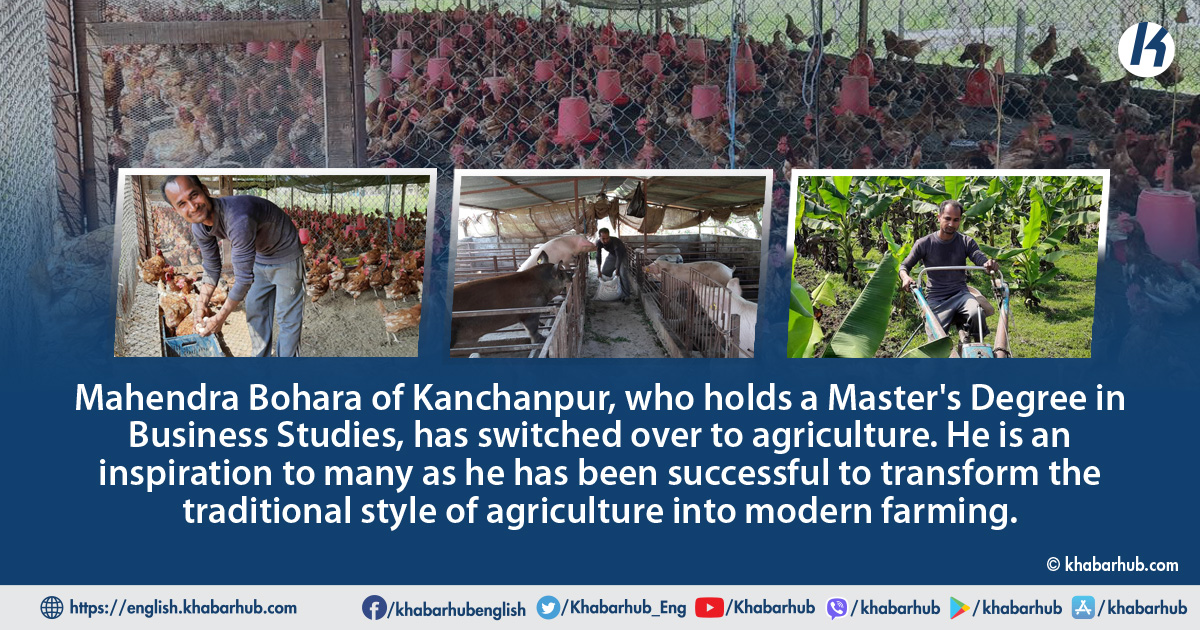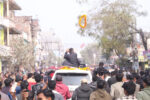ATTARIYA: Despite all odds, Kanchanpur’s Harendra Bohara saw a huge scope in agriculture.
While the majority of the people in Nepal are engaged in subsistence farming, he decided to give it a try in commercial agriculture.
Thirty-three-old Bohara, a permanent resident of Mauwaphanta in Kanchanpur district, set an example in commercial farming at a time when the trend of flying abroad is on a rise.
After completing his Master’s in Business Studies from Shankar Dev Campus in Kathmandu, Bohara made agriculture his main profession, and he is adding one more brick to his success ladder by transforming the traditional method of farming into a modern way.
Nepal being an agricultural country, the involvement of educated youth in this sector is negligible.
“Initially, I started with cow and buffalo rearing, which did not go well as strong winds blew away the shed. Moreover, since the cows were of local breed, it was not possible to modernize farming,” Bohara said.
He then tried his luck in agriculture in a “modernized” way.
Modernization in agriculture
In 2071 BS, he started cow and buffalo breeding business and banana farming. However, he received a lot of criticism from his family and neighbors.
Neighbors started criticizing him for involving himself in the agriculture and cow rearing profession despite holding a master’s degree, and that, too, from a reputed college in Kathmandu.
“I was least bothered by what people said,” Bohara said adding, “I continued to work, got a loan from a bank and started a modern farm.”
Initially, he took an agricultural loan of Rs 2 million to run an agribusiness.
“I raised 5,000 layers of chickens with the money. After six months, when it started to get better, I started banana farming and raising pigs along with chickens.”
He said that the annual turnover from poultry farming is Rs 1.5 million along with the production of as many as 3,500 to 4,000 eggs each day.

Bohara then installed his own grain production machine for chickens.
“It costs Rs 5 to 7 per kg to produce grains on our own,” he said.
According to him, it’s beneficial to produce grains on your own when you raise a large number of chickens.
“Now my chickens eat 7 quintals of grains daily. Even if I save Rs 7 per kg by producing grains myself, I can save Rs 4900 per day,” he boasts.
Meanwhile, the monthly turnover from chickens is 12 to 15 lakhs.
Bohara sends eggs to Jhalari, Gulariya and Attariya.
Besides this, he has planted bananas in 5 bighas of private land from which he makes Rs 7 to 9 lakhs monthly turnover.

Goat and pig rearing
Bohara has plans to expand his business by raising pigs and goats along with fish farming.
He has currently 24 boars. For this, he has taken a loan of Rs. 10 million from the Agriculture Development Bank.
Monthly income over one lakh rupees
Bohara currently earns a minimum of Rs one lakh per month. He shares his experience of working with the Himal Hydro Power and Golchha Organization for six months where he used to get Rs 30 thousand as salary per month.
“Agriculture is a reputed profession,” he said urging the younger generation to engage in agriculture.
Bohara has also been honored with the state-level best farmer award given by the Sudur Paschim government.









Comment